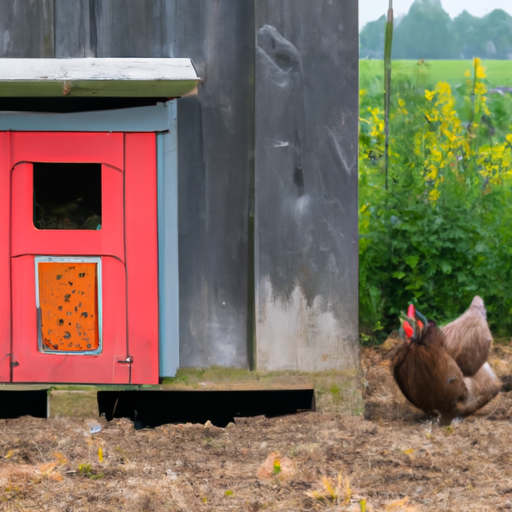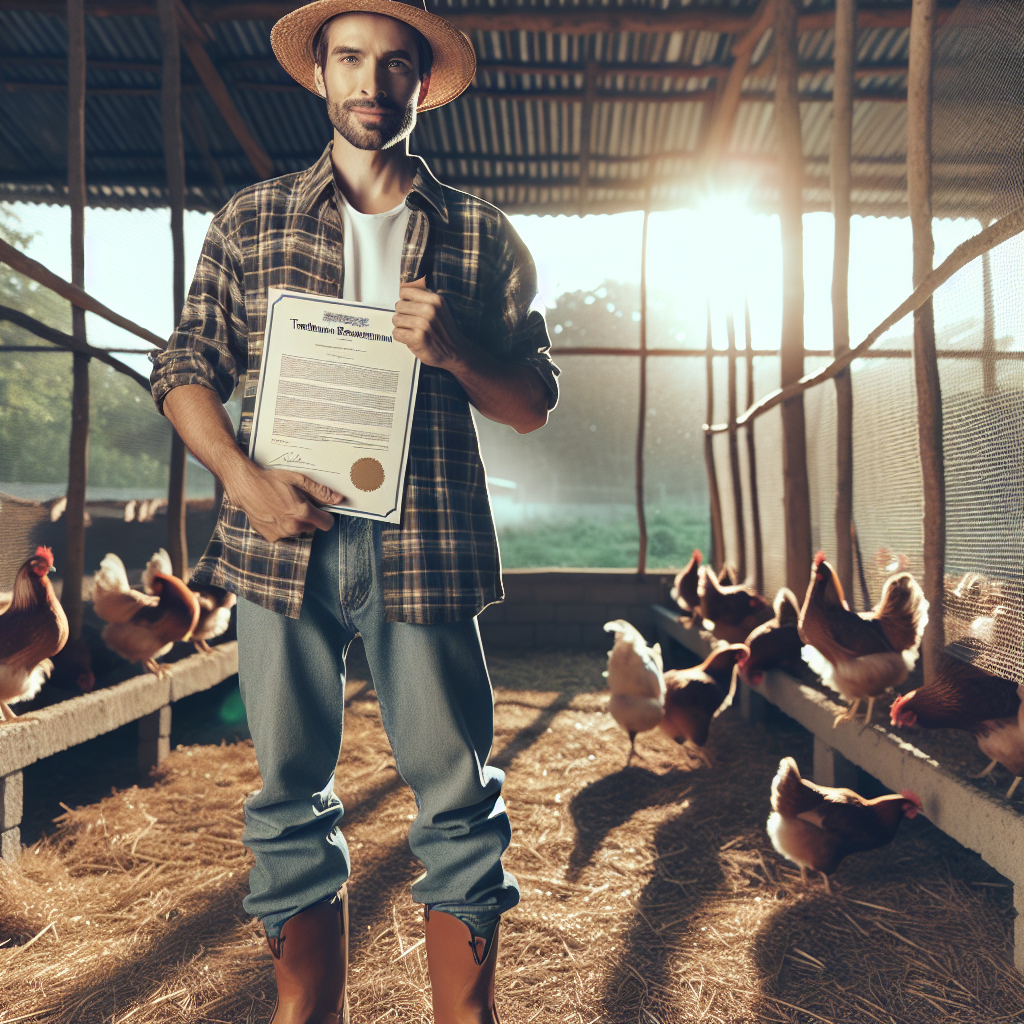Are you a chicken farmer looking to maximize the benefits of your business? If so, you’re in the right place. In this article, we will explore different legal structures that can help you achieve optimal benefits for your chicken farming business. Whether you’re just starting out or looking to restructure your existing operation, we’ve got you covered. From sole proprietorships to limited liability companies, we will guide you through the options so you can make an informed decision that suits your specific needs. Get ready to take your chicken farming business to new heights!
Choosing a Legal Structure
When starting your chicken farming business, one of the first decisions you need to make is choosing a legal structure. This will determine how your business is organized and operated, as well as its legal and financial liabilities. There are several options to consider, each with its own pros and cons.
Sole Proprietorship
A sole proprietorship is the simplest and most common form of business structure. It involves operating the business as an individual, without any formal legal structure. As a sole proprietor, you have complete control over your business and its profits. However, you are also personally liable for any debts or legal issues that may arise. This can put your personal assets at risk.
Partnership
If you plan to start your chicken farming business with one or more partners, a partnership structure may be a suitable option. In a partnership, the business is jointly owned and operated by two or more individuals. A partnership agreement should be in place to outline the responsibilities, profit-sharing arrangements, and decision-making processes. It’s important to note that each partner is individually liable for any debts or legal obligations of the business.
Limited Liability Company (LLC)
A Limited Liability Company, or LLC, provides a good balance between simplicity and liability protection. With an LLC, your personal assets are protected from business debts and lawsuits. This means that if your chicken farming business faces financial difficulties or legal issues, your personal assets such as your home or car cannot be seized to settle the debts. Additionally, an LLC offers flexibility in terms of management structure and tax benefits.
Corporation
For larger chicken farming businesses or those with plans for rapid expansion or going public, a corporation may be the most suitable legal structure. A corporation is a separate legal entity from its owners, known as shareholders. This means that the corporation has its own legal rights and liabilities. Shareholders are not personally liable for the debts or legal obligations of the business. However, setting up and maintaining a corporation can be more complex and costly compared to other legal structures.
Registering Your Business
Once you have chosen a legal structure for your chicken farming business, the next step is registering it with the appropriate authorities. This will ensure that your business is recognized and meets all the legal requirements. Here are the key steps to registering your business:
Choosing a Business Name
Selecting a catchy and unique business name is important for branding and marketing purposes. However, you also need to ensure that the name is not already registered by another business and does not infringe on any trademarks. Check with your local business registration office to see if your chosen name is available.
Obtaining the Necessary Permits and Licenses
Before you can start operating your chicken farming business, you will likely need to obtain various permits and licenses. These requirements may vary depending on your location and the scale of your operation. Some common permits and licenses may include zoning permits, environmental permits, and any specific permits related to poultry farming. Check with your local government agencies or consult an attorney to ensure you obtain all the necessary licenses.
Registering for Taxes
As a business owner, it is important to register for the appropriate tax identification numbers and comply with all tax obligations. This includes registering for federal, state, and local taxes. Depending on your location and the nature of your business, you may need to register for sales tax, payroll tax, or other applicable taxes. Consulting with a tax professional or an accountant can help ensure that you comply with all tax obligations.
Getting an Employer Identification Number (EIN)
If you plan to hire employees for your chicken farming business, you will need to obtain an Employer Identification Number (EIN) from the Internal Revenue Service (IRS). This unique identification number is used for tax purposes and is required when filing tax returns, making payroll tax payments, and conducting other business-related activities.
Complying with Local Regulations
Running a chicken farming business involves complying with various local regulations to ensure the health and safety of your animals, employees, and the environment. Here are some key areas to consider:
Zoning Laws and Permits
Check the zoning laws and regulations in your area to determine if your property is suitable for chicken farming. Some areas may have restrictions on the type or number of animals allowed, as well as setback requirements from neighboring properties. Make sure you obtain any necessary zoning permits and comply with all relevant regulations to avoid legal issues.
Environmental Regulations
Chicken farming can have an impact on the environment, particularly in terms of waste management and water usage. It is important to comply with all environmental regulations and implement proper waste management practices, such as composting or responsible disposal of chicken manure. Additionally, you may need to obtain permits or licenses related to water usage or environmental impact assessments.
Health and Safety Regulations
Ensuring the health and safety of your animals and employees is crucial. Implement proper biosecurity measures to prevent the spread of diseases and infections among your flock. Provide adequate training and protective equipment to your employees to minimize the risk of workplace injuries. Familiarize yourself with all relevant health and safety regulations and regularly review and update your practices to maintain compliance.
Maintaining Proper Record Keeping
Effective record keeping is essential for the success of your chicken farming business. Proper records can help you monitor and analyze your financial performance, track the health and production of your animals, and demonstrate compliance with regulations. Here are some areas where you should maintain detailed records:
Record Keeping for Finances
Keep accurate and up-to-date financial records, including income, expenses, and cash flow. This will help you assess the profitability of your business and make informed decisions regarding pricing, expenses, and investments. Maintain organized records of receipts, invoices, and financial statements. Consider using accounting software or consulting with an accountant to streamline your record-keeping process.
Record Keeping for Animal Health and Production
Maintain comprehensive records of your flock’s health, vaccinations, medications, and production data. This information is crucial for managing disease outbreaks, tracking growth rates, and identifying any potential issues. Keep records of any veterinary visits, tests, or treatments. Regularly review and update your records to ensure the health and well-being of your animals.
Insurance Documentation
Having appropriate insurance coverage is important to protect your business from unforeseen events or disasters. Keep copies of your insurance policies, including coverage details and contact information. Review your policies regularly to ensure they adequately cover your assets and liabilities. In the event of a claim, having well-documented records can help expedite the process and ensure fair compensation.
Securing Adequate Capital
Obtaining sufficient capital is crucial for starting and growing your chicken farming business. Assessing your financial needs, exploring financing options, and considering grants or subsidies can help you secure the necessary funds.
Assessing Financial Needs
Carefully analyze your financial needs by considering costs such as land or property, chicken coops and equipment, feed, veterinary services, and labor. Create a detailed budget to estimate your startup costs, ongoing expenses, and potential revenue. This will help you determine how much capital you need to acquire and how you plan to use it.
Exploring Financing Options
There are various financing options available to chicken farming businesses. Traditional loans from banks or credit unions are a common choice. Consider approaching agricultural lenders who may have specialized loan programs for farmers. Another option is crowdfunding, where you can raise capital from a large number of individuals who believe in your business concept. Explore different options and compare interest rates and terms to secure the best financing option for your needs.
Applying for Grants or Subsidies
Government agencies, nonprofits, and agricultural organizations often provide grants or subsidies to support small farmers and promote sustainable agriculture. Research and identify relevant grant programs and eligibility requirements. Craft a compelling grant proposal and submit it timely to increase your chances of obtaining financial assistance. Grants can help alleviate financial burdens and provide opportunities for growth and expansion.
Implementing Effective Marketing Strategies
To succeed in the competitive chicken farming industry, it is essential to develop effective marketing strategies that resonate with your target market. Here are some key steps to consider:
Identifying Target Market
Determine who your ideal customers are and understand their needs, preferences, and buying behaviors. Consider factors such as demographics, geographic location, and income levels. Conduct market research to gain insights into consumer demand, market trends, and competition. This will help you tailor your marketing efforts to attract and retain customers.
Creating a Brand and Unique Selling Proposition
Develop a strong brand that reflects your values, product quality, and commitment to animal welfare. Differentiate yourself from competitors by identifying a unique selling proposition (USP) that sets your chicken farming business apart. This could be attributes such as organic, free-range, or locally sourced products. Clearly communicate your USP through branding, packaging, and marketing materials.
Developing Pricing Strategies
Set pricing strategies that consider factors such as production costs, market demand, and customer perceived value. Research the prices of similar products in your market to ensure competitiveness. Consider offering different pricing tiers or discounts for bulk purchases to incentivize customers. Regularly review and adjust your pricing strategies based on market conditions and customer feedback.
Promoting Your Products
Utilize various marketing channels to promote your chicken farming business and products. Consider developing a professional website with detailed information about your farm, products, and contact details. Leverage social media platforms to engage with your target audience, share updates, and build a community. Participate in local farmer’s markets or agricultural fairs to showcase your products and connect with potential customers. Utilize traditional advertising methods, such as print media or radio, if they align with your target market.
Building an Efficient Supply Chain
A well-managed supply chain is crucial to ensure a consistent and reliable supply of quality chicken, feed, and equipment. Here are some steps to consider:
Sourcing Quality Chicken, Feed, and Equipment
Identify reputable suppliers for acquiring your chicken stock, feed, and equipment. Choose suppliers who follow best practices for animal welfare, biosecurity, and sustainability. Conduct thorough research, seek recommendations, and visit supplier facilities if possible. Establish relationships with suppliers who can provide consistent and high-quality products to meet your requirements.
Establishing Relationships with Suppliers
Building strong relationships with your suppliers is beneficial for both parties. Regular communication with suppliers helps ensure timely delivery, resolve any issues, and stay informed about new products or industry developments. Consider negotiating contracts or establishing long-term partnerships to secure favorable pricing and terms. Cultivating good relationships with suppliers can lead to better support and potential opportunities for collaboration.
Ensuring Timely Delivery
Efficient logistics and delivery are crucial to avoid disruptions in your chicken farming operation. Coordinate with your suppliers to establish clear delivery schedules and expectations. Maintain effective inventory management practices to ensure you have an adequate supply of chicken feed, medications, and other required materials. Consider backup plans or alternative suppliers in case of unforeseen circumstances that may delay deliveries.
Investing in Technology and Automation
Embracing technology and automation can improve efficiency, productivity, and profitability in your chicken farming business. Consider the following areas for investment:
Automated Feeding and Watering Systems
Investing in automated feeding and watering systems can save time and labor while ensuring your chickens receive consistent nutrition and access to clean water. These systems can be programmed to dispense the right amount of feed and water at specific intervals, reducing waste and improving chicken health. Automated systems also allow for remote monitoring and control, giving you peace of mind when you’re away from the farm.
Monitoring and Data Management Solutions
Implementing monitoring and data management solutions can help you track important metrics such as temperature, humidity, and ventilation in your chicken houses. These systems can provide real-time alerts and historical data to help you optimize conditions for your flock’s health and productivity. Data management software can help you analyze trends, make informed decisions, and comply with record-keeping requirements.
Biosecurity Measures
Investing in biosecurity measures is essential to prevent the spread of diseases and ensure the health of your flock. Consider implementing systems such as footbaths, handwashing stations, and isolation areas to minimize the risk of introducing or spreading pathogens. Install appropriate signage to remind staff and visitors of biosecurity protocols. Regularly review and update your biosecurity practices to stay current with industry standards.
Emphasizing Animal Welfare and Sustainability
Consumers increasingly value businesses that prioritize animal welfare and sustainability. Implementing practices that demonstrate your commitment to these areas can help differentiate your chicken farming business and attract conscious customers. Consider the following steps:
Implementing Good Animal Husbandry Practices
Adopting good animal husbandry practices is essential for the health and well-being of your chickens. Provide a comfortable and clean living environment, ensure proper nutrition and access to fresh water, and implement effective disease prevention and treatment protocols. Proper handling, transportation, and humane slaughter practices should also be followed. Regularly educate yourself on best practices and stay updated with industry standards to continuously improve your animal husbandry practices.
Environmental Stewardship
Implement environmentally-friendly practices to reduce the impact of your chicken farming activities on the environment. This can include practices such as composting chicken manure, implementing energy-efficient lighting and ventilation systems, and reducing water usage through efficient irrigation methods. Explore opportunities for renewable energy generation, such as installing solar panels. Demonstrating a commitment to environmental stewardship can enhance your brand image and attract environmentally-conscious consumers.
Exploring Organic Certification
Obtaining organic certification for your chicken farming business can open up new market opportunities and command premium prices. Organic certification requires adherence to strict standards regarding feed, medication use, animal welfare, and environmental practices. Research the requirements and processes involved in obtaining organic certification and determine if it aligns with your business goals and principles. Certification bodies can provide guidance and support in the certification process.
Networking and Collaborating
Building a strong network and collaborating with others in the industry can provide valuable support, knowledge sharing, and business opportunities. Consider the following strategies:
Joining Industry Associations and Networks
Research and join industry associations, farmer networks, or agricultural cooperatives that focus on poultry farming. These organizations provide opportunities to connect with other farmers, stay updated with industry trends, and access resources such as training programs or marketing support. Participating in industry events, conferences, and online forums can facilitate networking and collaboration.
Attending Conferences and Workshops
Attend conferences, workshops, or seminars related to poultry farming to expand your knowledge and skills. These events often feature industry experts, academic researchers, and experienced farmers who can provide valuable insights, tips, and strategies. Networking with other attendees can present partnership or collaboration opportunities.
Collaborating with Other Farmers or Producers
Consider collaborating with other farmers or producers in your area to share resources, reduce costs, or explore joint marketing initiatives. This could involve forming partnerships for bulk purchasing, cooperative marketing campaigns, or knowledge sharing. Collaborating with others can help maximize efficiency, diversify products or services, and strengthen your position in the market.
In conclusion, legally structuring your chicken farming business, registering it properly, and complying with local regulations are crucial steps to ensure its success. Maintaining proper record-keeping practices, securing adequate capital, implementing effective marketing strategies, building an efficient supply chain, investing in technology and automation, emphasizing animal welfare and sustainability, and networking and collaborating with others can further enhance your business’s growth and profitability. By following these guidelines and continuously adapting to changes in the industry, your chicken farming business can thrive and achieve optimal benefits.




